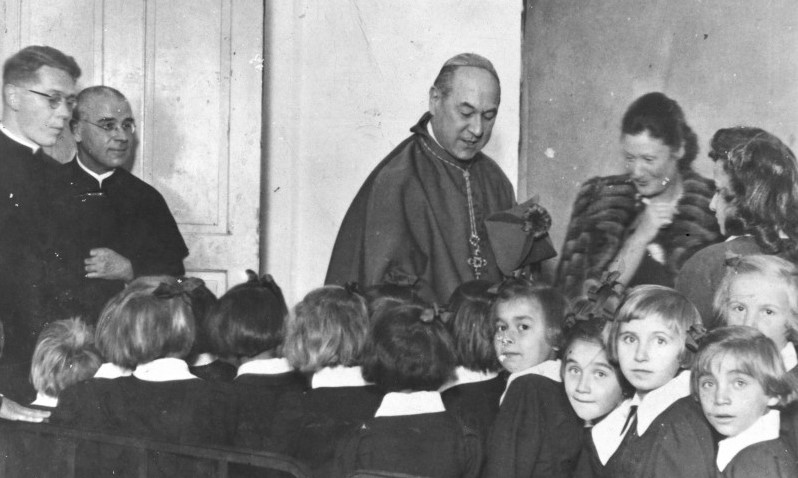Tartalom

Boldog Apor Vilmos
1945. április 2-án, húsvéthétfőn hunyt el báró Altorjai Apor Vilmos győri püspök. A népszerű főpapot nagypénteken a várost megszálló Vörös Hadsereg egyik ittas katonája három lövéssel súlyosan megsebesítette, mert ő megakadályozta, hogy a püspökvárban menedéket kereső lányokat és asszonyokat elhurcolják. Kiállásával püspöki jelmondatát - "A kereszt erősíti a szelídet és szelídíti az erőset" - követte és életét adta nyájáért.
Édesapja, id. báró Apor Gábor régi székely nemesi család sarja, édesanyja gróf Pálffy Fidélia. Vilmos kilenc gyermekük közül mint utolsóelőtti 1892.február 29-én Segesváron született. Gimnáziumi tanulmányait a jezsuitáknál végezte, Kalksburgban és Kalocsán. Érettségi után azonnal belépett a győri szemináriumba. Az innsbrucki egyetemen szerzett teológiai doktorátust. 1915. augusztus 24-én szentelték pappá. Gyulán kezdte el szolgálatát, mint káplán. Szociális elkötelezettségét bizonyítja a "Nővédő Iroda" alapítása és tevékenysége Schlachta Margit nővérrel a "Szociális Missziótársulat"-ban. 1917-ben egy kórházvonatra van beosztva, azután egy évig prefektus a nagyváradi szemináriumban, minekutána visszahelyezik Gyulára, mint plébánost.
Lelkipásztori és szociális tevékenysége Gyulán igen eredményes. A Tanácsköztársaság idején kiállt az iskolai hitoktatás mellett, a román megszállás alatt Bukarestbe utazott, hogy kiszabadítsa a polgári túszokat. A katolikus megújulási mozgalmakat támogatta. Meghonosította Gyulán a szociális missziós és az egri ferences szegénygondozó nővéreket. Népmissziót és zarándoklatokat szervezett, híveivel részt vett az országos vallásos rendezvényeken. Gondja volt a szegény gyerekek taníttatására, tandíjról és ruházatukról gondoskodott. Több, mint két évtizedes gyulai munkássága alatt elnyerte a "szegények plébánosa" megtisztelő címet.
1937 február 20-án lépett be a Szuverén Máltai Lovagrendbe, mint tiszteleti konventuális káplán.
1941 február 24-én szentelték püspökké Gyulán. Az ünnepség költségeit bátyja, báró Apor Gábor fedezte, aki később a máltai rend kancellárja lett. Az új püspök pedig a Szent István Gyermekotthon adósságait egyenlítette ki.
Lelkipásztori és szociális tevékenységét mint püspök sikeresebben tudta folytatni, de a háború politikai állásfoglalást is megkívánt. A katolikus szociális mozgalmak vezetői számára szervezett értekezleten már 1943 augusztusában megállapította: "A Harmadik Birodalom győzelme kizártnak látszik, és a vesztett háborút hazánkban is politikai és társadalmi átalakulás fogja követni.". Felhívta hallgatói figyelmét arra, hogy rajtuk is múlik, "hogy az átalakulás valóban demokratikus szellemű legyen."
1944-ben, Pünkösd vasárnapján értesült arról, hogy Győrött felállítják a gettót. Ünnepi szentbeszédében a következő szavakkal ítélte el a zsidók üldözését: "Aki megtagadja a kereszténység alaptörvényét a szeretetről, ...és azt hirdeti, hogy szabad embereket kínozni, legyenek azok akár négerek, akár zsidók, az bármennyire is kérkednék azzal, hogy keresztény, olyan, mint a pogány és nyilvános bűnös." Még aznap levélben tiltakozott a nyilas belügyminiszternél a zsidók összegyűjtése ellen és beadványokat írt a kormányzónak és a hercegprímásnak az internálások és deportálások miatt.
1997. július 7-én II. János Pál pápa jelenlétében, dekrétummal ismerte el a Szentszék báró Apor Vilmos mártíromságát. A boldoggá avatási szertartás Rómában volt 1997. november 9-én. Emléknapját május 23-án tartjuk.
MMLSz Emlékkönyve 1928-2003/ Frank Miklós és Zichy János
